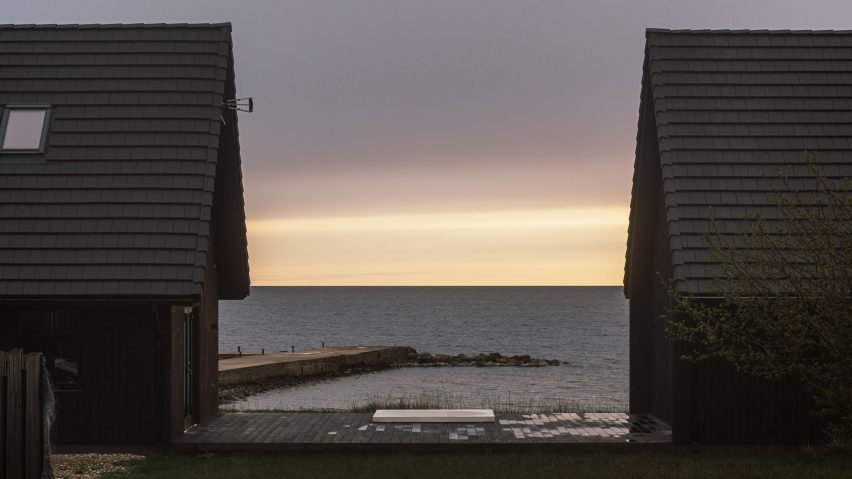Two gabled cabins with pitch-black exteriors form a holiday house on Matsi Beach in Estonia, built on the remains of a Soviet-era fishing village by architect Hanna Karits.
The summer house sits on the seaside surrounded by old fishing sheds and the wooden skeletons of boats.
The two gabled forms sit on axis with one another, split in the middle by an area of decking that frames a view of the sea.
A small hot tub has been set into the decking between the two buildings.
The larger of these two structures contains the home itself, while the smaller one houses a boathouse, sauna guest room and kitchenette.
"The larger building, with its focused views which change with the seasons and the time of day, serves as the main living area," said Karits.
Facing out onto a sunken terrace area is a completely glazed gable end, which fills the living space with light as well as allowing for dramatic views out to the landscape.
"The views from the large glass facade open up along the beach towards an evening sunset whereas the fireplace positioned in front of the facade creates an intimate feeling at night," said Karits.
A sunken terrace is protected from the wind and screened by trees.
Externally, the cabins are almost entirely finished in black, with the white-rendered wall of the sunken terrace as the only contrasting pale element.
"In order to oppose the surroundings the houses were painted black," said Karits. "Spruce was used in combination with black stone for the roof and smoked ash for all the terraces."
Internally, this appearance has been completely contrasted. Furniture and textiles emphasise the beach holiday vibe, with white painted birch lining walls and ceilings, pale wood furniture and fixings and stone tiling in the bathrooms.
There is a slight step down between the dining and living area, and the ceiling of the mezzanine above the kitchen giving way to a double-height area beneath the pitched roof.
Also in Estonia, KUU Arhitektid recently designed a timber summer house in the village of Muraste.
Photography is by Tõnu Tunnel.
Project credits:
Architect: Hanna Karits
Collaborators: Annes Arro, Mart Tamm
Interior architect: Hanna Karits

